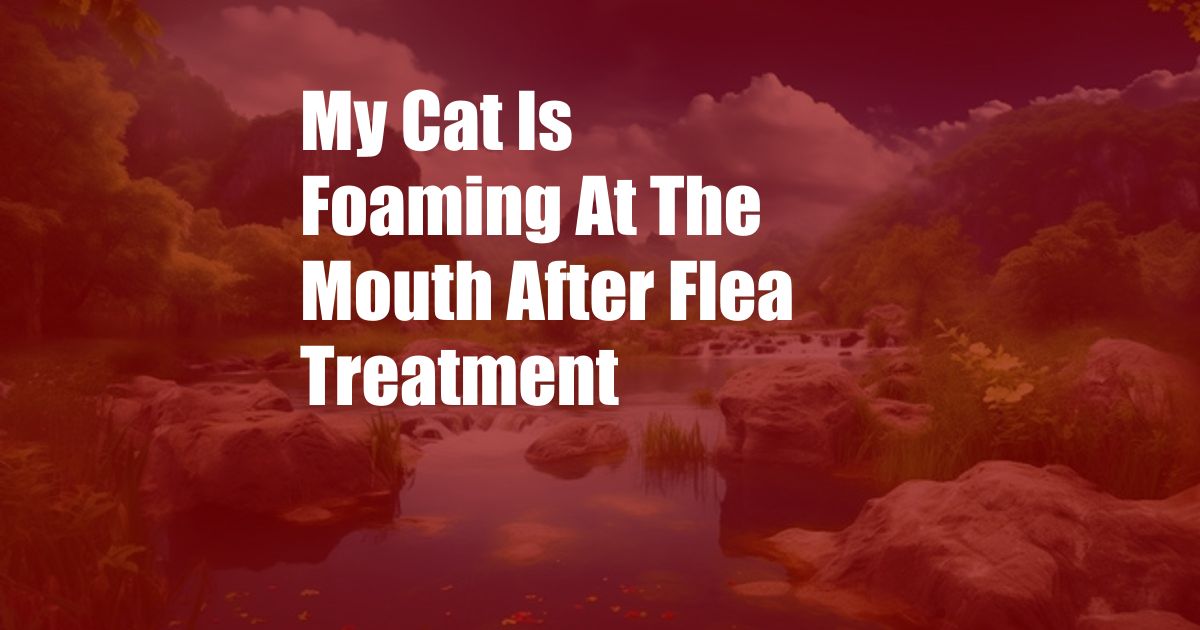
My Cat Is Foaming at the Mouth After Flea Treatment: What to Do
My heart sank as I watched my beloved feline friend, Mittens, frothing at the mouth after a flea treatment. Panic set in as I desperately searched for answers to this alarming symptom.
A Frightening Reaction to Flea Treatment
Flea treatments, while essential for protecting our pets from these pests, can come with side effects. One of the most concerning is excessive foaming at the mouth. This reaction is caused by the active ingredients in the treatment, which can irritate the cat’s mouth and throat. In most cases, the foaming is harmless and will subside within a few hours. However, there are some instances where it can indicate a more serious underlying condition, such as an allergic reaction or ingestion of the treatment.
Monitoring Your Cat’s Reaction
If your cat experiences foaming at the mouth after flea treatment, here are some steps you should take:
- Monitor the foaming: Observe the duration and severity of the foaming. If it persists for more than a few hours or becomes excessive, contact your veterinarian immediately.
- Check for other symptoms: Foaming may be accompanied by other signs of discomfort, such as excessive salivation, difficulty swallowing, or breathing problems. Any of these symptoms warrant veterinary attention.
- Rinse the mouth: Gently rinse your cat’s mouth with water to dilute the treatment. Do not induce vomiting, as this can worsen the situation.
- Consult your veterinarian: If you are concerned about your cat’s reaction or if the foaming persists, seek professional advice from your veterinarian.
Expert Tips and Advice
Based on my experience and consultations with veterinary professionals, here are some additional tips to consider:
- Choose a reputable flea treatment: Some flea treatments are more likely to cause adverse reactions in cats. Consult with your veterinarian to determine the best option for your pet.
- Follow instructions carefully: Always follow the manufacturer’s instructions and dosage recommendations to minimize the risk of side effects.
- Monitor your cat closely: Keep an eye on your cat after applying the treatment to promptly address any adverse reactions.
- Keep treatment out of reach: Flea treatments can be toxic if ingested. Store them safely away from your cat and other pets.
Frequently Asked Questions (FAQs)
-
Q: Why does my cat foam at the mouth after a flea treatment?
-
A: Foaming is a common reaction to the active ingredients in the treatment, which can irritate the mouth and throat.
-
Q: Is foaming always harmful?
-
A: No, in most cases, foaming is harmless and will subside within a few hours. However, prolonged or excessive foaming may require veterinary attention.
-
Q: What should I do if my cat foams at the mouth?
-
A: Monitor the severity and duration of the foaming. Rinse your cat’s mouth with water and contact your veterinarian if the foaming persists or if your cat exhibits other symptoms.
Conclusion
Understanding the potential side effects of flea treatments is crucial for responsible pet ownership. By monitoring your cat’s reaction, following veterinary advice, and implementing these precautions, you can help minimize the risk of adverse reactions and protect your feline companion’s well-being.
Are you interested in learning more about cat care and feline health? Explore our website for comprehensive articles, expert insights, and valuable resources to enhance your knowledge and provide the best care for your furry friend.